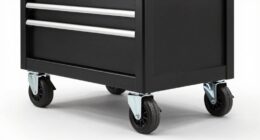To select the right drill bit, consider the material you’ll work with. For wood, use twist bits; for metal, HSS or cobalt bits work best. Masonry projects need carbide-tipped bits for durability, while specialty tools like diamond-tipped bits handle glass, tile, or stone. Matching the bit to your task guarantees efficiency and safety. Keep in mind proper maintenance to extend the tool’s life. Explore more types and tips to master your projects.
Key Takeaways
- Different drill bits are designed for specific materials like wood, metal, masonry, and glass.
- High-speed steel, cobalt, and masonry bits are common for versatile or tough material drilling.
- Specialty bits like diamond-tipped are used for hard surfaces such as tile and stone.
- Proper maintenance and selection based on material hardness improve drill bit lifespan and performance.
- Safety precautions, including appropriate gear and securing workpieces, are essential during drilling tasks.
Common Types of Drill Bits and Their Applications

To choose the right drill bit for your project, it’s important to understand the common types and their specific uses. Different drill bits are designed for various materials and tasks, affecting their durability and performance. For example, high-speed steel bits are versatile but may wear out faster if not maintained properly. Cobalt bits excel at drilling through hard metals thanks to their durability, while masonry bits are built for concrete and brick. Proper drill bit maintenance, like cleaning and storing bits correctly, extends their lifespan and ensures consistent results. Recognizing these types helps you select the right bit for your needs, saving time and effort. Knowing the strengths of each type also helps you avoid unnecessary damage and optimize your project outcomes. Additionally, understanding the differences between drill bits can help you make more informed choices for various tasks.
Specialty Drill Bits for Unique Materials and Tasks

When working on specialized projects, standard drill bits often don’t cut it, and you need tools designed for specific materials or tasks. Specialty drill bits like diamond tipped bits are perfect for drilling into hard surfaces such as glass, tile, or stone. Masonry specialty drills are designed to handle tough materials like brick, concrete, or mortar, providing durability and precision. These bits are essential when working with high-density materials that wear out regular bits quickly. Additionally, the development of automation in industry continues to influence the design and manufacturing of these specialized tools, ensuring they meet evolving technological standards.
Tips for Choosing the Right Drill Bit for Your Project

Choosing the right drill bit for your project depends on understanding the material you’re working with and the specific task at hand. Selecting the appropriate bit guarantees efficiency and safety. Consider the material’s hardness and the desired hole size. Proper drill bit maintenance, like keeping bits sharp and clean, extends their lifespan and improves results. Always follow safety precautions when drilling, such as wearing goggles and securing your workpiece. Use this quick reference:
| Material | Drill Bit Type | Safety Tips |
|---|---|---|
| Wood | Twist Bit | Keep hands clear, steady pressure |
| Metal | HSS or Cobalt Bit | Use lubricant, secure workpiece |
| Masonry | Carbide-tipped | Wear safety glasses, steady grip |
Additionally, understanding the different drill bit types can help you select the most effective tool for each specific task.
Frequently Asked Questions
How Do I Sharpen Dull Drill Bits Effectively?
To sharpen dull drill bits effectively, you need proper drill bit maintenance and the right sharpening techniques. Start by securing the bit in a bench grinder or a sharpening stone. Use a consistent angle, usually around 118 degrees, to restore the cutting edge. Keep the bit cool to prevent damage, and regularly check the sharpness. With practice, you’ll maintain your drill bits efficiently, ensuring peak drilling performance and longer tool life.
Can I Use One Drill Bit for Multiple Materials?
Using one drill bit for multiple materials is like trying to fit a key into every lock—it might work sometimes but isn’t always reliable. While some drill bits offer good material compatibility and versatility, others are designed for specific tasks. To avoid damaging your project or tool, choose a bit suited to each material. Relying on one bit can save time but risks poor results or wear, so pick wisely.
What Safety Precautions Should I Take When Changing Drill Bits?
When changing drill bits, you should prioritize safety. Always wear personal protective equipment like gloves and safety goggles to protect against sharp edges or debris. Make sure to disconnect the power source before handling the drill. Use proper tool handling techniques to securely loosen or tighten the chuck. Taking these precautions reduces the risk of injury and guarantees a safe, efficient bit change process.
How Do I Determine the Correct Drill Bit Size for My Project?
To determine the right drill bit size for your project, start by considering the material you’re working with and the purpose of your hole. Match the drill bit material to your task for ideal results. Adjust the drilling speed based on the bit and material—slower for harder materials. Measure carefully and select a bit that fits your needs, ensuring the hole is precise and your project progresses smoothly.
Are There Environmentally Friendly or Biodegradable Drill Bits Available?
You’re wondering if eco-friendly or biodegradable drill bits exist. Yes, they do! These bits are made from biodegradable materials and are produced through eco-friendly manufacturing processes. By choosing such options, you help reduce environmental impact while completing your projects. Look for brands that emphasize sustainability and biodegradable materials, ensuring your tools align with your eco-conscious values. This way, you can work effectively and protect the environment simultaneously.
Conclusion
Choosing the right drill bit can boost your project’s success, as using the correct type reduces damage and improves efficiency. Did you know that approximately 70% of drill bit failures come from using the wrong bit for the material? By understanding common and specialty drill bits, you’ll work smarter and achieve cleaner, more precise results every time. So, take your time, select wisely, and watch your projects turn out better than ever.









